Dil Deke Dekho isn’t quite the perfect film I’d like to make it out to be.
(a) The story isn’t exactly original (Nasir Hussain had already used it in Tumsa Nahin Dekha. He also went on to use it in Jab Pyaar Kisi se Hota Hai and Phir Wohi Dil Laaya Hoon, but that can’t be laid at the doorstep of Dil Deke Dekho).
(b) The plot is too complicated, relies too heavily on convenient coincidences, and has some unbelievable – and often unclear – motives.
(c) The lead actress, Asha Parekh (just 16 years old), though pretty as a picture, isn’t a terribly good actress at this stage of her career.
On the other hand: the film stars Shammi Kapoor.
That may sound very biased, but let’s be honest. This was Shammi Kapoor’s film, all the way. He ruled it. He was charming, suave, the perfect lover, the perfect son, the perfect everything. He was even better in this than he had been in Tumsa Nahin Dekha, enacting an almost-identical role to the one that had catapulted him to stardom two years earlier.
The film begins in the past, with Harichand (Wasti) coming to meet his mistress Nagina (Indira Billi) with the happy news that he has carried out a thoroughly nefarious plan to lay hands on a vast amount of wealth.
A stranger – resembling Harichand in build and height – had turned up at Harichand’s house, and had died there of a heart attack. Harichard has put his own clothes on the corpse, shot the corpse through the face badly enough to disfigure it beyond all recognition, and has planted a letter on the corpse. The letter is addressed to Jamuna Devi (Sulochana Latkar), the wealthy woman who is Harichand’s employer.
While Harichand and Nagina watch from the window of her house, Jamuna Devi arrives with her husband Rana Raghubir (Surendra). She finds a crowd gathered outside Harichand’s home. The police are there too, and dissuade her from trying to see the corpse for herself; it’s too badly mutilated, says the inspector. He does, however, tell her that a letter addressed to her has been found in the pocket of the corpse. Jamuna Devi asks the inspector to read out the letter.
The letter, in Harichand’s handwriting, implies that Jamuna Devi and he (Harichand) have been having an affair for several years, and Harichand has now given up hope of ever having her all to himself, so he’s committed suicide. He also implies, in his letter, that his little son Kailash, whom Jamuna Devi has been bringing up with her own toddler Roop, is in reality the illegitimate child of Harichand and Jamuna Devi.
This results in a huge to-do between Jamuna Devi and her husband. The poverty-stricken Rana Raghubir has always been aware that he’s married a very wealthy woman, and now accuses her of marrying him simply for his youth and his looks (considering they’ve been married only three years, he seems to have gone to seed superquick).
Poor Jamuna Devi does all she can to deny the ‘dead Harichand’s’ filthy allegations, but to no avail. Rana Raghubir, in a fit of anger, gathers up his son Roop and leaves.
Years pass. Jamuna Devi has brought up Kailash (now Rajendranath) as her foster son. Kailash has been looking after the operations of the Royal Hotel in Ranikhet, which Jamuna Devi owns – and has been drawing money for his own use left, right and centre. He’s a buffoon and a moron, but he’s also a spendthrift, and Jamuna Devi is most annoyed when she discovers what Kailash has been up to.
In the meantime, our heroine appears on the scene. This is Neeta (Asha Parekh, billed as ‘A Filmalaya Discovery’, though she had been a child actress, and had even appeared as Vyjyantimala’s friend in Aasha in 1957). Neeta is the daughter of Jagat Narain ‘Jagat Babu’ (Raj Mehra), a friend of Rana Raghubir and Jamuna’s. Jamuna has already willed half her substantial property to Neeta. Jamuna and Jagat Babu have decided that Neeta and Kailash will be married once Neeta, who’s been studying in London, returns. Neeta is back in India now, and Kailash is eager to get his hands on Neeta and all her gorgeous money.
We now (finally!) catch up with our hero. Rana Raghubir had, all those years ago, fled his wife along with his son, Roop. Shortly after, working in a factory, Rana Raghubir had an accident that blinded him. Now, after all these years, Roop (Shammi Kapoor) has managed to make arrangements for his father’s eyes to be operated upon.
Incidentally, Rana Raghubir has been affectionately calling Roop ‘Raja’ all these years.
The surgeon is in Delhi, so Rana Raghubir’s friend Murli (Mumtaz Ali, the father of Mehmood) offers to accompany Rana Raghubir from Nainital (where they stay) to Delhi.
There’s a silly digression here now. Neeta, who’s in Nainital, is told by one of her friends that a drummer at a hotel had slapped one of Neeta’s friends after having led her on. Neeta vows to avenge her friend’s disgrace. We end up with a song, some tamaasha, and poor Roop (who’s the drummer in question) being thrown out of his job.
What now? With no job, Roop has no money to pay for his father’s eye operation. Murli’s son (and Roop’s buddy), Tom (?) points out an ad in the newspaper: the Royal Hotel in Ranikhet needs a bandmaster. Roop is bound to get the job; they should go to Ranikhet at once.
But Roop has another plan (actually, only a ploy to inject some more songs and some rather tedious comedy into the plot).
Roop tells Tom that in foreign countries, there are private investigators; why shouldn’t he (Roop) offer his services as one? He has published an ad in the newspapers, calling himself Professor Saamri – and there have already been two requests for Professor Saamri to meet potential clients.
These turn out to be:
(a) Kailash, who hires Saamri to get rid of Chandra, some no-account young man whom Neeta has brought to her home to recuperate after he had an accident; Kailash fears that Neeta is getting too fond of Chandra.
(b) Neeta herself, who wants Saamri to get rid of Kailash – as in, break off the ‘engagement’ – for her.
This is followed by some convoluted and idiotic twists and turns, with Chandra and Kailash both getting the boot, and Neeta being eternally grateful to Saamri. She has already, by the way, met Roop in his undisguised form. He’s told her his name is Raja, and they’ve had several rather melodious run-ins. Neeta is attracted to this stranger, but always manages to resist temptation.
Roop hands over the money he’s earned as Saamri, to Rana Raghubir. Roop and Tom decide to go to Ranikhet and apply at the Royal Hotel.
Murli and Rana Raghubir set off by train for Delhi. On the way, just as the train is pulling out of the station, Jagat Babu – who’s come to see off a friend – sees and recognises Rana Raghubir. He cannot stop the train, but he begins enquiries to discover where Rana Raghubir lives. Jamuna, on being told, is very grateful and hopes to be reunited with her husband soon.
When Rana Raghubir and Murli get off at Bareilly to change trains, Rana Raghubir discovers that someone has picked his pocket and made off with the money. Now what?
As luck would have it, also on the platform is an old enemy: Harichand. Harichand has been living in Rangoon all these years, and has now returned along with his son Sohan (Siddhu, in his debut).
Harichand recognises Rana Raghubir immediately, and Sohan decides to go and find out what Rana Raghubir is up to. The blind man confides in this solicitous young man, and tells him all: about Roop alias Raja, the stolen money, the operation in Delhi, and so on. Sohan tells Rana Raghubir that he, Sohan, is headed for Ranikhet and can carry a letter for Roop, if needed. A grateful Rana Raghubir agrees, and scrawls a letter to Roop, which he gives to Sohan along with a photo of Roop’s, so that Sohan is able to recognise Roop.
Sohan and Harichand set off for Ranikhet and the Royal Hotel, where some more snooping around yields results. They discover that Jamuna Devi has willed half her wealth to Neeta and the other half to her son Roop (who, of course, is still lost). Now all Sohan needs to do is convince Jamuna Devi that he, Sohan, is in fact her long-lost son Roop. Then, if he marries Neeta, he will not only get Roop’s share of Jamuna Devi’s money, but also Neeta’s share, since he intends to kill Neeta.
If you think that’s complicated enough, watch on. There are many more plots and subplots, twists and complications and misunderstandings…
…and, to redeem it all, a romance and some lovely songs.
Frankly, of all the versions of this well-worn story of Nasir Hussain’s, I think Dil Deke Dekho is the most complicated. It’s not incoherent, but after a while, I began losing the thread of how and why people were doing what they were doing. Despite that, I don’t know how many times I’ve watched this film, simply because it’s such a wonderful Shammi Kapoor showcase.
What I liked about this film:
Shammi Kapoor. He’s so much fun, so very much the epitome of the romantic-comic-heroic Hindi film hero of the 50s and 60s. And, oh, he looks so good.
Asha Parekh. One of my favourite actresses, though here her acting skills are still raw; she’s a little gauche in places. But very pretty nevertheless.
The music, by Usha Khanna (another ‘Filmalaya Discovery’). Even though the score of Dil Deke Dekho had the dubious distinction of borrowing three tunes almost verbatim from Western songs (the title song is based on the McGuire Sisters’ Sugar in the morning; Pyaar ki kasam hai is a copy of Ivory Joe Hunter’s Since I met you baby, and Meri Neeta is a very easily recognisable copy of Paul Anka’s Diana)… a lot of the other songs are very, very nice. My particular favourite is Hum aur tum aur yeh samaa, but Bade hain dil ke kaale and Yaar chulbula hai haseen dilruba hai are almost as good.
And, house favourite Edwina Lyons can be seen in several scenes as one of Neeta’s friends:
What I didn’t like:
Read the first paragraph of this post.
And some of the costumes. Please. What was Bhanu Athaiya thinking of?
I have watched Dil Deke Dekho at least a dozen times. I know most of the plot (which doesn’t mean all of it makes sense to me!), but I still love to watch it – because it’s so easy on the senses, so entertaining and lovely and unbeatable time-pass.

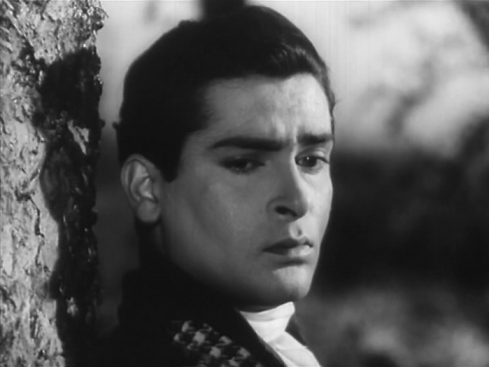
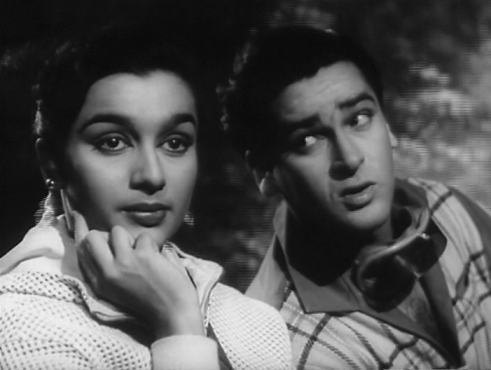
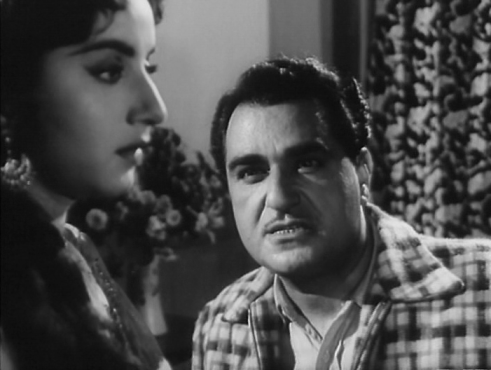
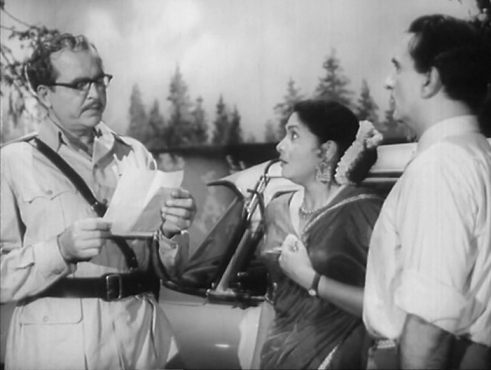
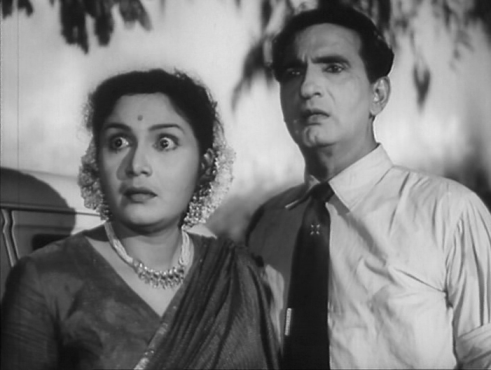
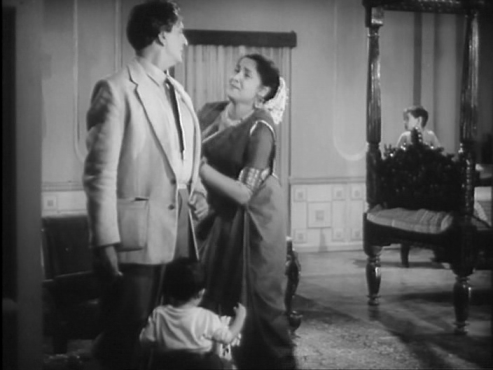
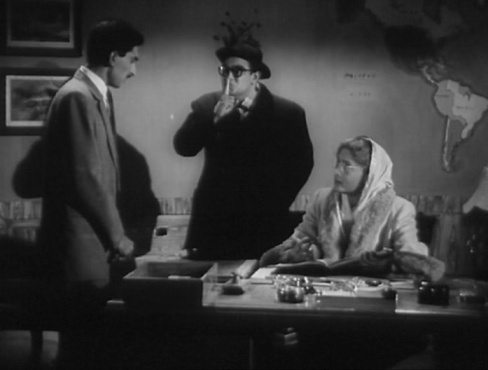
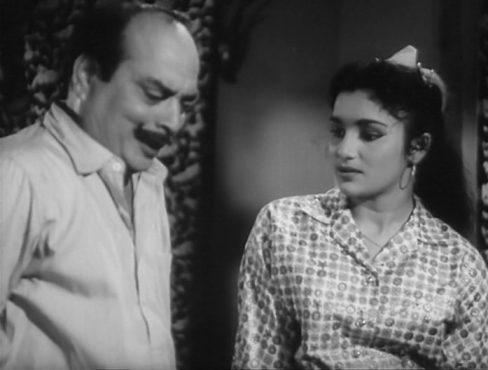
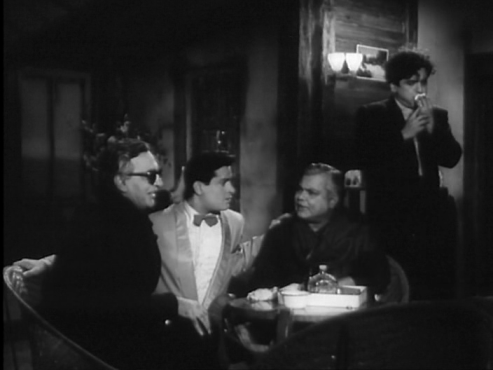
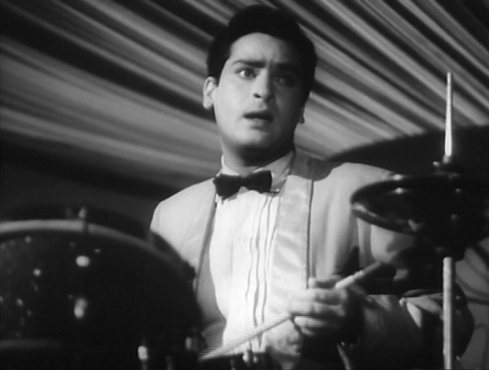
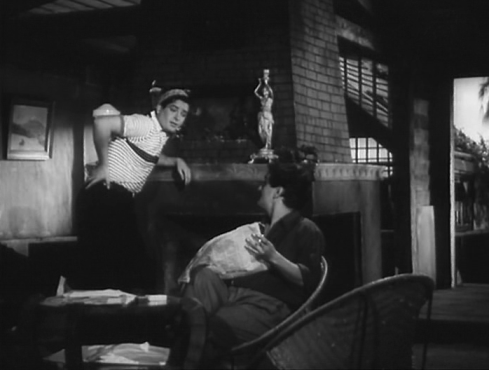
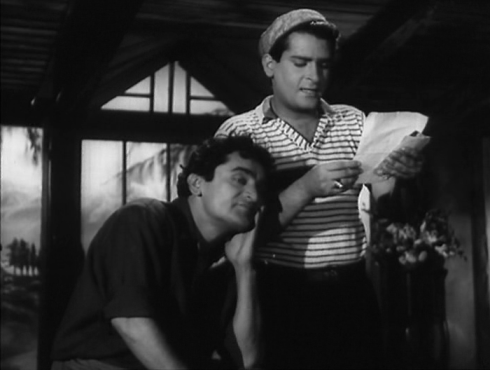
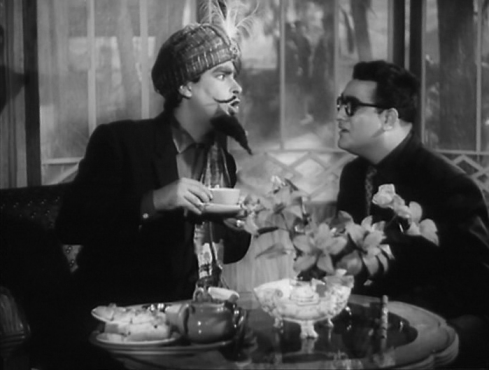

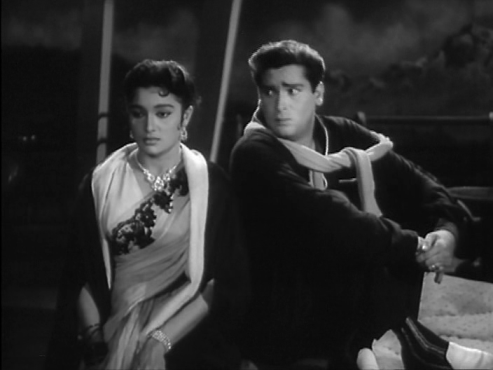
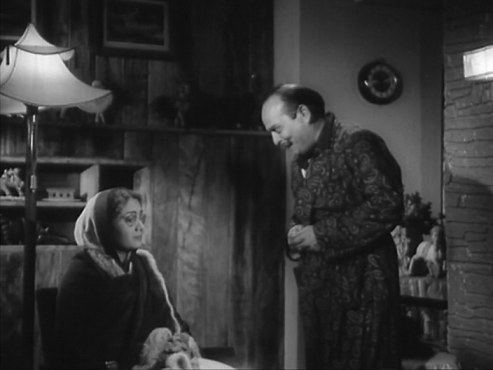
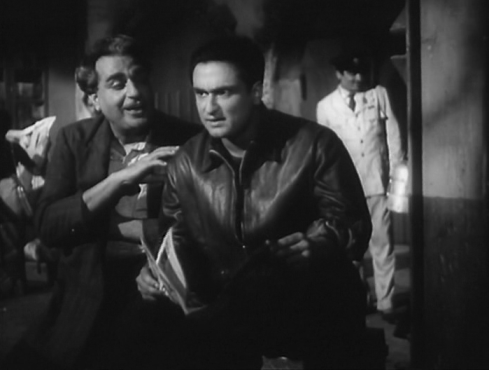
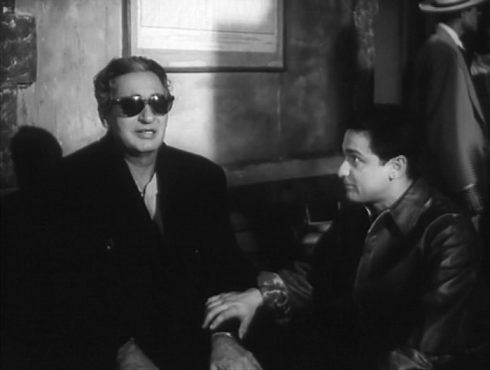
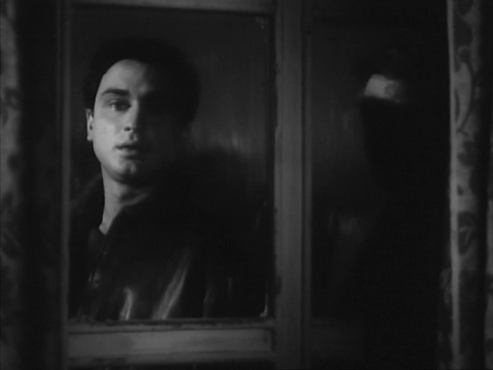
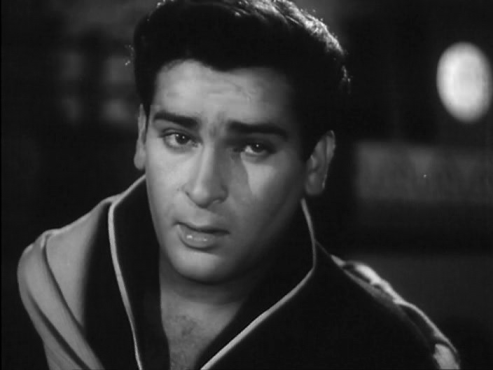
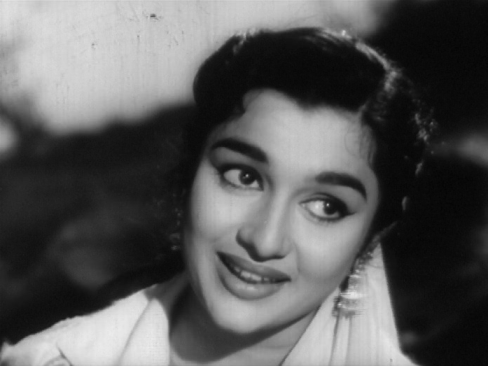
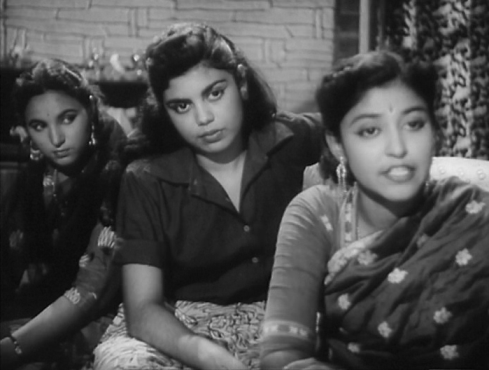
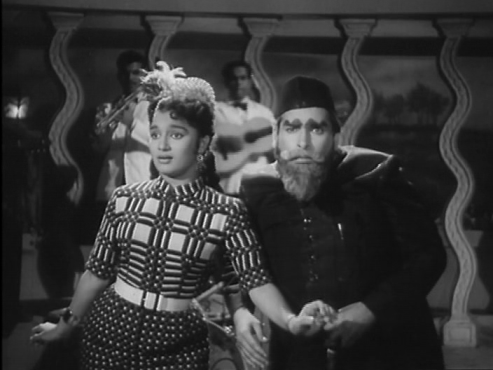
Aha! So we start with Dil Deke Dekho, a movie whose songs I absolutely LOVE – even if some of them have been lifted from western tunes.
I remember the title song was an antakshari favourite when I was a kid (had not seen the movie then) but personally I like the soft, romantic “hum aur tum aur ye sama” much more. And “bade hain dil ke kaale” is just so foot-tappingly wonderful (not to mention Edwina!), coming as it does as sequel to “megha re bole ghanan ghanan” (I just love, love, love this sequence). I don’t know how many youtube hits there are for these songs but I would think I’ve contributed very significantly to the numbers. :-)
Then there’s “bolo bolo” which isn’t too bad either! “Yaar chulbula hai” is also wonderful, for the Rafi-Asha play in it.
As for the story, well, it’s been a while since I last saw this movie but I do remember it being full of sub-plots and co-incidences. And also plenty of reminders of Tumsa Nahin Dekha, which I’d seen only shortly before I saw this movie (so I do get confused between the two films often). I remember Raj Mehra playing an army man role (“Colonel/Major saab” types), I think it was in this. He had a standard line or mannerism, I think.
Also, in his disguise, Shammi keeps saying “azeeza”? Much like Raj Kapoor in “Dil Hi To Hai”? And did he “yahoo” a lot here too, like he does in TND?
Anyway, I just vaguely remember these scenes – need to watch this movie again. Now that you’ve de-mystified the story for us, it should be easier watching it. Not sure I’d have been able to figure this out on my own.
But then, not that it really matters in a Shammi movie. ;-)
Thanks, Madhu.
LikeLike
You’re right about Raj Mehra playing that army man role – it’s never specifically mentioned that he is/was in the army, but there’s a buff geniality about him that is stereotypical of retired army officers in Hindi films. ;-) He always says “Jolly good, jolly good!” at the end of just about every sentence.
(Which is why Shammi Kapoor, in one of his disguises – as a certain Mirza Changezi – keeps appending each of his own sentences with “Hollywood, Hollywood!” And Asha Parekh tries to cover up by saying that Mirza Changezi’s takhallus is ‘Hollywood’!)
And yes, as Professor Saamri, Shammi Kapoor refers to Asha Parekh as azeeza – he also addresses Rajendranath as azeez. He didn’t yahoo a lot, but there was the occasional yoohoo (also there in Tumsa Nahin Dekha).
What a thoroughly likeable film. Completely illogical and silly at times, but such a feast for the senses!
LikeLike
Besides yoohoo/yahoo, there’s quite a bit of “tally-ho” going on in this movie. And of course all that tally-ho’ing finally finds itself immortalized in the song from Chinatown.
LikeLike
Yup, I remember the tally ho-ing too. There was a good bit of yoo-hoo in Tumsa Nahin Dekha, by the way.
LikeLike
My DVD has both DDD and Tumsa Nahin Dekha in it. I saw the latter one once and didn’t feel like a repeat at all. The heroine is too dull – pretty, but no Asha Parekh in beauty and impish charm. Though her first movie, Asha brings a certain vivacity to her role. I quickly go to the songs menu of TND and watch just the songs and avoid the movie after that first watch. The parts with the tribes people is quite annoying in TND.
LikeLike
“The parts with the tribes people is quite annoying in TND.”
You too? :-D I hated that bit – I thought it was very contrived and silly. I didn’t mind Ameeta in Tumsa Nahin Dekha – and the songs are fantastic – but really, I think Dil Deke Dekho is in a completely different league. It’s much more entertaining and slick… and Shammi Kapoor is at his best.
LikeLike
http://www.thehindu.com/todays-paper/tp-features/tp-fridayreview/my-first-break-shammi-kapoor/article1716589.ece sharing link of shammi ji talking about his first break. shammi forever !
LikeLike
Interesting. Thanks for sharing that!
LikeLike
Ok, you lost me there once the story started getting so complicated that my eyes started glazing over. :D But that said, I’ve seen this movie eons ago and would love to see it again. Despite the complexity of plot, you have to say that they don’t make movies like that any more! I’m a big fan of Shammi Kapoor. For some reason I always thought he looked like my dad! :D
LikeLike
There was something really rather endearing about a lot of these old films, despite the incoherence and complexity of the plots, wasn’t there? Perhaps the music, the charm and the sweetness of it all compensated. Somehow, there’s an artificiality about a lot of modern films that turn me off – which is why a new film needs to have a really good script and acting and music and more to keep me hooked.
Now I really want to see a photo of your dad! :-)
LikeLike
:-) Thanks for the link!!! Perfect thing to watch tonight!
And yes, today the films are either talking relationship mumbo jumbo or spewing ridiculous gags as comedies. I miss the good ol’ days where we knew what we were getting when we sat down to see a film, esp the Hrishikesh Mukherjee kinds and Shammi Kapoor’s films.
Our family has this odd relationship with Shammi Kapoor. We had all his songs on tape which we would play every time we went on a road trip and somehow my bro and I thought he looked a lot like our dad when our dad was young. :-) Will have to hunt an old snap of his and scan it. Also my younger sister who was only 2 when my father died for some reason really loved Shammi Kapoor. She used to squeal in delight every time we saw his songs or movies and would actually call him ‘Shammi Kapoor, mera beta!’ :D This was when she was not even five herself!
LikeLike
Shammi Kapoor songs are so addictive, aren’t they? I already have a post written up (but yet to be published – it’ll come up within the next few days) about my ten favourite Shammi Kapoor songs, and the fact that they’re invariably so good to listen to while going on long road trips… :-)
I love Hrishikesh Mukherjee films too. Of course, he was very varied in his repertoire – Anupama or Anand are a world apart from total farce like Chupke-Chupke – but both ends of the spectrum (and just about everything in between) are masterpieces in their own way.
That’s such a sweet story about your kid sister calling an onscreen Shammi Kapoor “Mera beta!” Sweet, but very touching too.
LikeLike
Agree about the effect of Shammi songs. Some of them are great “drinking buddies”. Like Hai duniya usiki and Tumne mujhe dekha and Hum aur tum aur yeh sama.
LikeLike
Since I don’t drink, I guess I won’t be able to comment on that, but yes – the very wide range of songs that have been picturised on Shammi Kapoor means that there’s a good Shammi Kapoor song for just about any situation: party, a drive through the countryside, a melancholy evening… whatever.
LikeLike
P.S. Andaleeb: Dil Deke Dekho is there on Youtube, in multiple parts. The first of the parts is here:
http://www.youtube.com/watch?v=UwdCHcheoqk
LikeLike
Actually, just because ‘Dil Deke Dekho’ is like a few other Nasir Hussain films, and the plot is so unbelievably complicated, I can watch it again and again, because it is familiar, and yet, one always unravels a little bit more each time. :)
I do remember being taken aback at Rana Raghubir’s accusation “You married me because of my looks.” It was hilarious.
LikeLike
I remember (one of the first times I watched Dil Deke Dekho on VCD) having actually rewound to hear, once again, that dialogue about “Tumne mujhse shaadi meri jawaani aur husn ke liye ki” – I couldn’t believe I’d heard that right. ;-)
Surendra, even in his heyday, was no oil painting. And Dil Deke Dekho was certainly past his heyday!
LikeLike
Oh god, I thought in the morning as I read it, I didn’t understand the plot because I read it so fast. Now this is the second time I’m reading it and still don’t understand it.
You mean to say that Asha Parekh was really 16 year old?
Doesn’t sound really probable, does it?
But she looks pretty all the same, though she doesn’t have the finesse of her later films.
Have to leave now again and will try to understand the plot today evening!
LikeLike
Don’t even try to understand the plot, harvey. Believe me, I’ve seen it quite a few times and I still haven’t figured out all the intricacies of why and how and where and when…
Yes, Asha Parekh was just about 16 when this film was made. It was released on her 17th birthday. She doesn’t look it, no? But then, come to think of it, Mumtaz was just about 16 when she’d already become a fairly familiar face in B-grade films.
LikeLike
I liked “Dil Deke Dekho” when I first saw it, Shammi Kapoor is my all time favourite actor & Usha Khanna’s songs were very good, especially for a first time music director, however I couldn’t watch the movie again beyond the first 20 minutes on DVD because Asha Parekh’s Donald Duck voice grated on my nerves, although she’s pretty. I guess my benchmark will always be Sadhana’s lovely soft voice.
LikeLike
“Asha Parekh’s Donald Duck voice grated on my nerves”
Hehe! Well said. :-D
LikeLike
This is also on my list of much loved Shammi films, and have watched it several times. In fact now that you’ve brought it up I’m sure I’ll watch it soon.
A thought occured to me yesterday after reading the ‘eye candy’ post about how we love his melting eyes and good looks without a thought of 6 packs (which sounds so unromantic anyway) which is the measuring yardstick at present.
LikeLike
I liked your observation about ‘six packs’ (yes, so unromantic!!). True, one never even thought about those when admiring the looks of people like Shammi Kapoor. I do prefer the slimmer, pre-1965 version of Shammi Kapoor, but I honestly don’t think his (or anyone else’s) having (or not having) six pack abs would have made the slightest bit of difference.
I guess cinema (and I’m not just talking Hindi cinema, but also Hollywood, to a huge extent – more even than Bollywood) has made the perfectly-honed body a BIG thing. More even than acting. I don’t know if that’s what cinema is all about. If an actor has a superb physique but can’t act to save his life, what’s the point?
Anyway. Just my two cents.
LikeLike
So confusing, so convoluted, and so entertaining. This is one of my ‘any-time-watch’ movies. When I just want to unwind. Of course, I’m sure that if I tried to follow all the twists and turns and jumps that the plot takes, I would get a headache instead of being entertained, so I just immerse myself in Shammi, Shammi and more Shammi :) Thanks for the screen caps – awesomely awesome.
LikeLike
I wish I’d thought of that phrase – the one about watching this film not to follow the plot, but to immerse oneself in Shammi, Shammi and more Shammi – it’s just so correct! Dil Deke Dekho may not have the most coherent plot of Shammi Kapoor’s films, but it’s a boon for anybody who likes him as much as I do. (But, now that I think of it, there are other films – even stuff like Boyfriend and An Evening in Paris) which may have less complex plots and/or an equal amount of eye candy, but which I still don’t find as entertaining as Dil Deke Dekho).
LikeLike
Now after reading for the third time, I got atleast some of the threads. But it is very difficult to understand everybody’s actions.
But I think one watches the film for Shammi, he does look good here.
Shammi’s character did advance in Nasir Husain’s films, didn’ it?
He was promoted from the accusation of slapping the heroine’s friend to killing the heroine’s sister!
Talk of character development!
Wonderful write up!
LikeLike
>He was promoted from the accusation of slapping the heroine’s friend to killing the heroine’s sister!
LOL! Good one.
LikeLike
LOL Harvey. And same heroine too! And both accusations false (as if Shammi would do such a thing!) – one would think she learnt from the first experience, no?
LikeLike
Who said you can’t critically analyse fluff like these Shammi Kapoor films? You are brilliant, harvey. Love that. :-D
(Though, as far as I remember, in Teesri Manzil, Asha Parekh’s character didn’t think he’d murdered her sister – just that he’d seduced her sister and then jilted her, leading the sister to commit suicide. That was why Asha Parekh & Co. had come armed with hockey sticks to bash up the seducer). Still, spurning a woman merely because she makes eyes at you, and (8 years later) spurning a woman after you’d have your wicked way with her are two different things!
LikeLike
One of my most favourite films… Sooooo enjoyable!!
LikeLike
Same here. :-) This was one of the first films I began searching for as soon as I acquired a VCD player, long before DVDs became common in India!
LikeLike
I love this film inspite of all its complications! Thoroughly entertaining and it’s songs are among my all time favourites. It’s such a delight to watch Shammi Kapoor in this film.
LikeLike
For entertainment value, there’s no beating Shammi Kapoor, is there? And this one is definitely very entertaining, no matter how complicated the intricacies of the plot.
LikeLike
I know this is about Shammi Kapoor and I agree with everyone that Shammi Kapoor films had the best songs. As a kid I am told I would sing the songs from Shammi Kapoor’s films, for insatance Bolo bolo kuch to bolo would change to bo oh bo oh the letter L was silent. But what i want discuss here is that Nasir Hussein always managed to disappoint me. You see as a kid the only thing that interested me in afilm was the dance sequences so I had all the heroines who were also excellent dancers marked out and Asha Parekh was one of them. So imagine my disappointment when I saw this film and watched Asha Parekh sitting through out “Bade hai dil ke kale”. This was not the only film- in Baharon ke sapne again directed by Nasir Hussein Asha Parekh had to just stand and lip synch to “Chunri sambhal gori”
LikeLike
Oops the comment shows up twice please delete the first one
LikeLike
Done, Shilpi.
In response to your comment: I really think your anecdote about your rendition of Bolo bolo kuchh toh bolo is very cute! I can just imagine. :-)
Yes, it was odd that Nasir Hussain used as good a dancer as Asha Parekh and didn’t really get her to show off her skills much. In fact, even other than Bade hain dil ke kaale, Asha doesn’t really get to dance very much – at least not in the styles she was especially good at – in Dil Deke Dekho. She does a folksy dance in Yaar chulbula hai and a sort of Western one in Do ekam do do dooni chaar, but that’s it.
But Nasir Hussain learnt later, Shilpi. Have you seen Phir Wohi Dil Laaya Hoon? One of Asha Parekh’s very good classical dance performances is in that, from the song Dekho bijli dole:
http://www.youtube.com/watch?v=fLXqVvbaRcI&feature=related
LikeLike
Yes thanks for reminding me this dance with Rani also an accomplished dancer was really a feast for the eyes, thanks I enjoyed watching it once again.
LikeLike
And thank you for identifying her for me, Shilpi! I didn’t know that dancer’s name was Rani. She was really good too.
(Incidentally, another very early Asha Parekh film which has a lovely dance by her was Hum Hindustani). This is the one I mean, Chori-chori tori aayi hai Radha:
http://www.youtube.com/watch?v=6x3O9TtA65E
LikeLike
Lol at Bhanu, I actually love that outfit sans the hat on Asha, i think she looks fab. And thanks for linking the original song choices I had no idea, though I haven’t seen this, i am well familiar with the infectious ear worm title track which has now gone into the encyclopaedic bollywood knowledge section of my brain.
LikeLike
Bhanu Athaiya had this penchant for odd hats, it seems! ;-) Even in Mere Sanam, there was this plethora of very weird headgear teamed with clothes that didn’t match them at all.
https://dustedoff.wordpress.com/2011/08/26/mere-sanam/
LikeLike
I think despite being only 16, Asha’s acting as a bubbly teen is wonderful here. And surprisingly she looks so grown up in a sari in the song “Bolo bolo”.
LikeLike
Yes, she’s lovely (in a grown-up way) in Bolo bolo, isn’t she? I think also in Hum aur tum aur yeh sama.
LikeLike